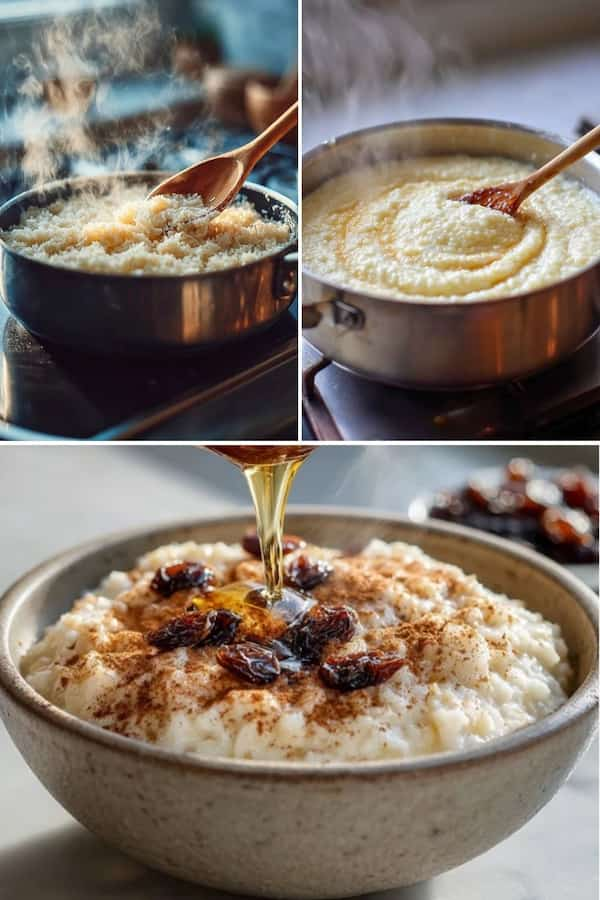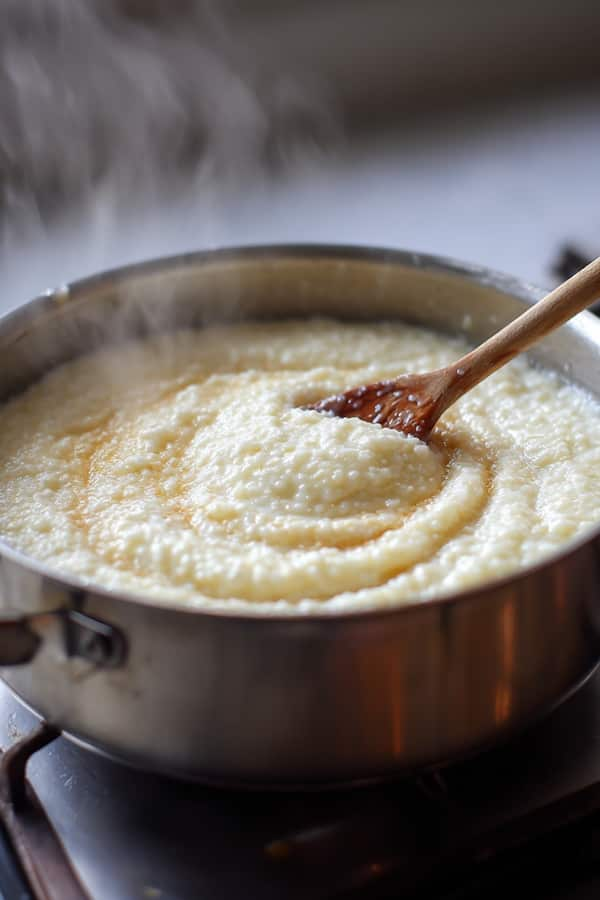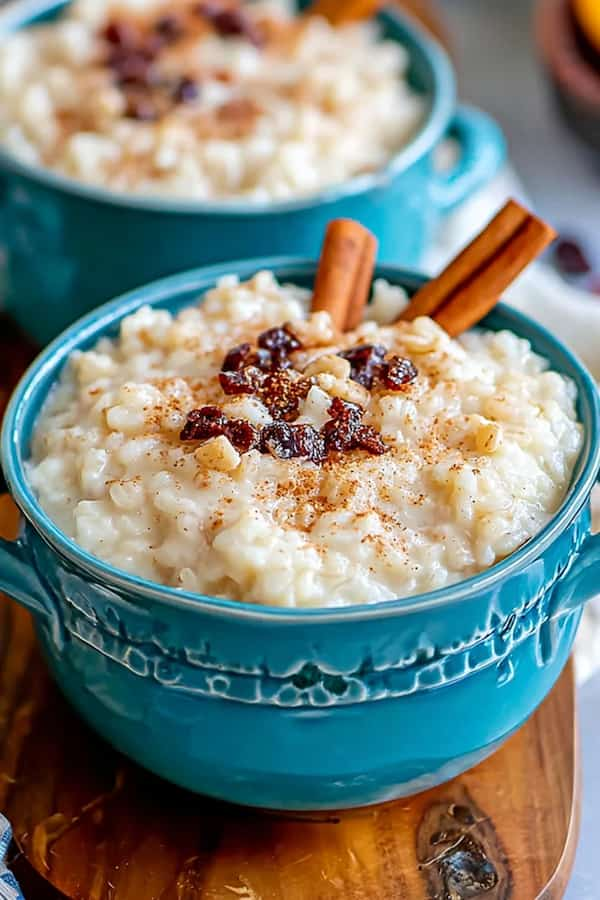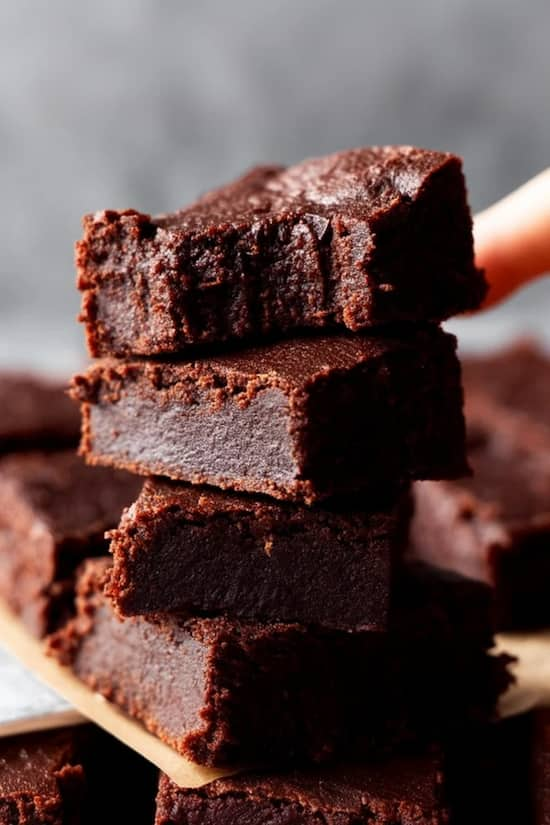Rice pudding is one of those desserts that instantly feels like home. It’s simple, creamy, and comforting — like a hug in a bowl.
The best part about rice pudding? It’s made from pantry staples you probably already have — rice, milk, sugar, and a few flavorings. It’s budget-friendly, easy to prepare, and tastes great warm or chilled.
I also explained how to make this recipe with leftover rice.

Ingredients
For about 6 servings:
- 1 cup uncooked white rice (short-grain or medium-grain)
- 4 cups whole milk (you can use 2%, but whole gives the best texture)
- ½ cup granulated sugar
- ¼ teaspoon salt
- 1 teaspoon vanilla extract
- ½ teaspoon ground cinnamon
- ½ cup raisins (optional)
Optional toppings: whipped cream, toasted nuts, or a drizzle of caramel sauce.
How To Cook Rice Pudding
In a medium saucepan, combine the rice with 2 cups of water and a pinch of salt. Bring it to a boil, then reduce the heat, cover, and simmer for about 15 minutes until the rice is tender and most of the water is absorbed.
Add the Milk and Sugar
Stir in the milk and sugar. Bring the mixture to a gentle simmer over medium-low heat. This is where the magic starts — the rice absorbs the milk and becomes creamy.
If you are using leftover rice, combine rice and milk in a saucepan. then gently heat, stirring frequently until it reaches a creamy consistency — usually in 10–20 minutes.

Stir and Simmer
Let the mixture simmer gently, stirring often so it doesn’t stick to the bottom of the pot. Cook for about 20–25 minutes, or until the pudding thickens. The consistency should be creamy but not dry — think of a rich custard.
Add Flavorings
Stir in the vanilla extract and cinnamon. If you’re adding raisins, fold them in at this stage so they plump up in the warm pudding.
Cool or Serve Warm
You can serve rice pudding right away while it’s warm and cozy, or let it cool slightly and chill it in the fridge for a few hours for a thicker, firmer texture. Both ways are delicious — it just depends on your mood.
Why You’ll Love This Recipe
This rice pudding is creamy, lightly sweet, and spiced just enough to feel cozy without being overwhelming. It’s also incredibly versatile.
You can eat it plain, top it with whipped cream, or dress it up with fruit or nuts. Plus, it’s naturally gluten-free, making it a dessert almost everyone can enjoy.
It’s also one of those recipes that uses simple, inexpensive ingredients but feels like something much more special. Perfect for a weeknight dessert, holiday gathering, or just when you want something nostalgic.
Make It Yours
One of the best things about rice pudding is how easy it is to customize. If you don’t like raisins, leave them out. If you love coconut, swap half the milk for coconut milk for a tropical twist.
Add orange or lemon zest for a fresh, bright note. For a richer version, stir in a splash of heavy cream at the end.
If you’re a chocolate fan, add a handful of chocolate chips while the pudding is still warm and stir until melted. And for those who like a little spice, try nutmeg or cardamom instead of cinnamon.
Tips for the Best Rice Pudding
- Use short or medium-grain rice. These varieties release more starch, making the pudding creamier. Long-grain rice will work, but the texture won’t be as rich.
- Stir often. This keeps the pudding from sticking to the pot and ensures a smooth, creamy texture.
- Adjust sweetness. If you like it less sweet, cut the sugar down to ⅓ cup. For a sweeter version, add a touch more.
- Thicken as you like. If you want a looser pudding, cook it a little less. For a thicker version, simmer longer.
- Serve your way. Some people swear rice pudding should always be cold, others love it warm. Honestly, there’s no wrong answer.
How to Serve
Rice pudding is simple enough to serve as an everyday dessert but can also be dressed up for guests. Spoon it into bowls and dust with cinnamon for a classic look. Add whipped cream and toasted nuts if you want something fancier. Fresh berries or sliced bananas on top make it feel extra special, too.

If you’re serving it for the holidays, drizzle it with caramel sauce or sprinkle crushed gingersnaps on top for a festive touch.
Storage and Reheating
Keep leftover rice pudding in an airtight container in the fridge for up to 4 days. It will thicken as it chills, so stir in a splash of milk when reheating to loosen it up. You can warm it gently on the stove or in the microwave.
A Dessert That Feels Like Home
There’s something timeless about rice pudding. It’s humble, budget-friendly, and doesn’t need anything fancy to shine. Whether you’re serving it warm on a chilly night or chilled on a hot summer day, it’s the kind of dessert that always hits the spot.
If you’ve never made it from scratch before, this recipe is a great place to start. Once you taste it, you’ll understand why it’s a classic — and maybe even start your own rice pudding tradition.

Rice Pudding
Ingredients
Method
- In a medium saucepan, combine the rice with 2 cups of water and a pinch of salt.
- Bring it to a boil, then reduce the heat, cover, and simmer for about 15 minutes until the rice is tender and most of the water is absorbed.
- Stir in the milk and sugar. Bring the mixture to a gentle simmer over medium-low heat.
- Let the mixture simmer gently, stirring often so it doesn’t stick to the bottom of the pot. Cook for about 20–25 minutes, or until the pudding thickens.
- Stir in the vanilla extract and cinnamon. If you’re adding raisins, fold them in at this stage so they plump up in the warm pudding.
- You can serve rice pudding right away while it’s warm and cozy, or let it cool slightly and chill it in the fridge for a few hours for a thicker, firmer texture.
Notes
- Use short or medium-grain rice. These varieties release more starch, making the pudding creamier. Long-grain rice will work, but the texture won’t be as rich.
- Stir often. This keeps the pudding from sticking to the pot and ensures a smooth, creamy texture.
- Adjust sweetness. If you like it less sweet, cut the sugar down to ⅓ cup. For a sweeter version, add a touch more.
- Thicken as you like. If you want a looser pudding, cook it a little less. For a thicker version, simmer longer.
- Serve your way. Some people swear rice pudding should always be cold, others love it warm. Honestly, there’s no wrong answer.



